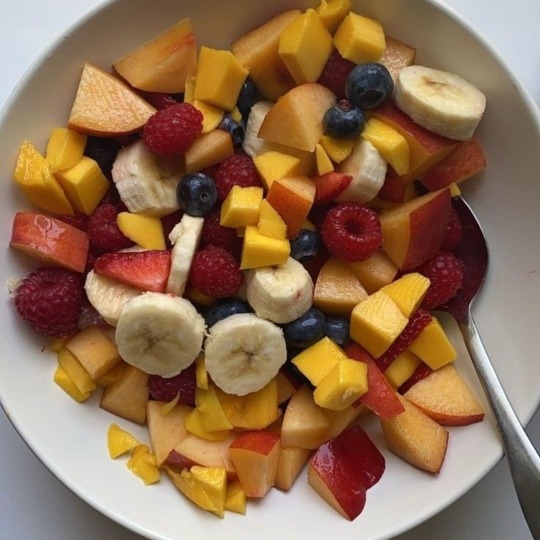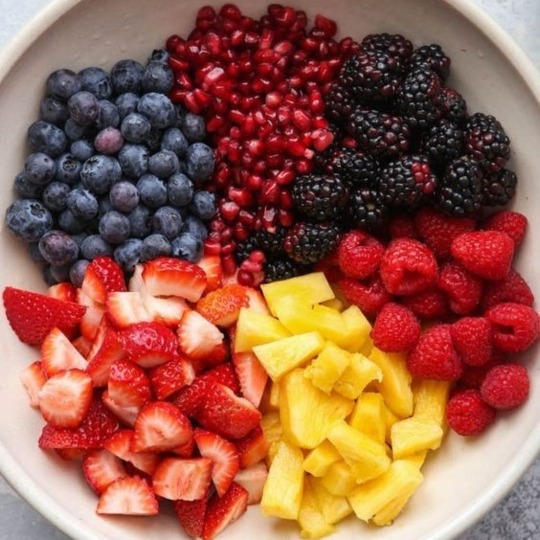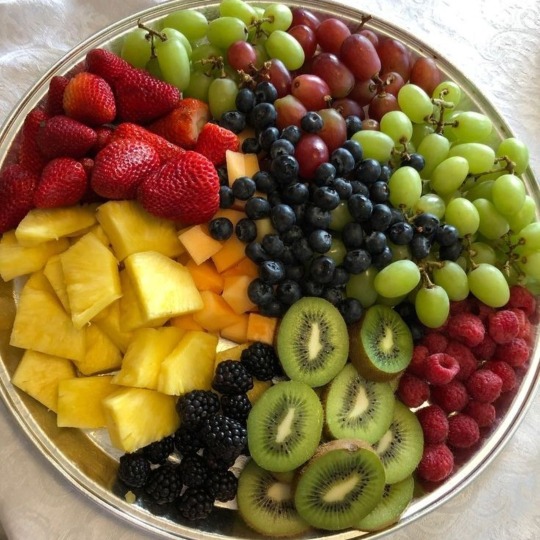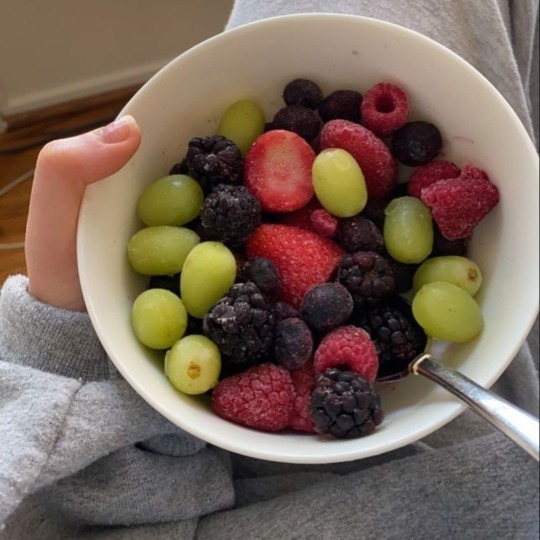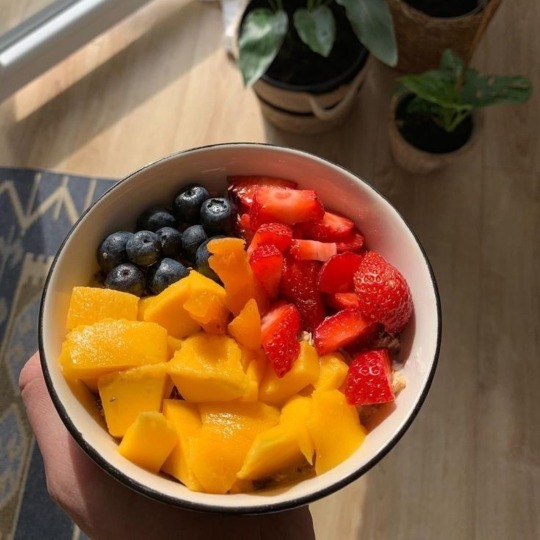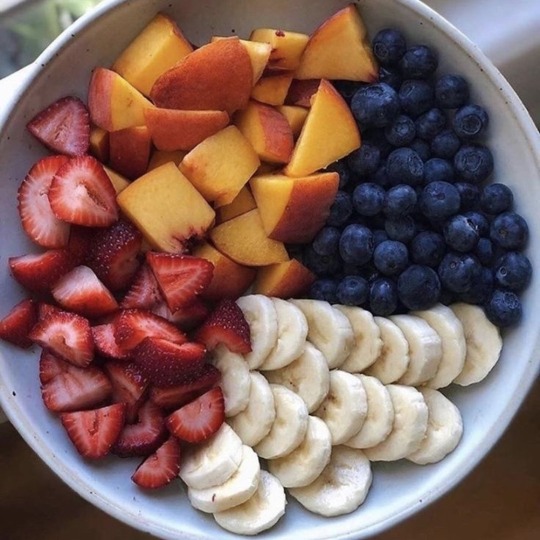Text
#first person plural like i'm talking to a kindergartener#'now we will go do the dishes' and 'we are being so brave about this'
8K notes
·
View notes
Text
the vindication i experienced last night when my dear friend @andtheremustbetowers told me I my outfit reminded them of Evie from the Mummy
#action adventure librarian IS my gender. and im finally on the way to achieving it#if any1 has clothing recs for that particular gender please send them to me btw
3 notes
·
View notes
Note
top 5 tautologies
1) it is what it is
2) it ain't over 'til it's over
3) if you're reading this, you're literate
4) what doesn't kill you doesn't kill you
5) find a penny, pick it up, all day long you'll have a penny
top 5s
343 notes
·
View notes
Text
*NOTE: in this case, phobia refers to a very strong irrational fear, not being a little scared of something. if you can handle snakes but they make you nervous, that's not a phobia.
#used to have trypanophobia#but my life is one of gods jokes so i am constantly subjected to needles#blood draws and local anesthesia mostly but obviously also vaccines and occasional other medical situations#life has forced me into exposure therapy
17K notes
·
View notes
Text
Funmaxing: How to Create a Character You'll Like Playing
Part Two: Choosing Your Features
'part one: choosing a role that fits' can be found here.
Okay, so you've decided on the roles that sound fun to you and that suit your character. Now for the fun part: actually doing character creation.
Every part of character creation is made up of two basic elements: flavor and mechanics. Each of these affects the other; when people talk about the 'fantasy' of a given class, they're referring to the experience created by the synthesis of the flavor and mechanics. For instance, the 'fantasy' of the Ancestral Guardian barbarian is a character that goes into a mystical warrior state to deliver no-holds-barred beatdowns, powered by the support of their long-dead ancestors. In order for that fantasy to work, you need both the flavor of the 'mystical warrior state' and the 'support of long-dead ancestors,' and the mechanics that let this idea work out in practice -- a character needs to be able to deal sizable damage in one-on-one combat, with meaningful support mechanics from their ancestor spirits.
The trick of choosing character options that work for you is twofold: you must determine which mechanics let you engage in the roles you have selected in part one, while also checking the flavor for compatibility with your character's roleplay concept.
First, let's talk mechanics.
Understanding how to choose mechanics that you will personally enjoy is surprisingly difficult; I think it's because the flavor is doing so much heavy lifting that it's hard to see the game expectations underlying each concept, and because it takes experience to recognize how different mechanics interact. To help provide examples, I'll be using a friend's character from my prior campaign to demonstrate.
Alice is a half-orc with the guild artisan background and the wild magic sorcerer class.
How does D&D expect Alice to behave? What does she do?
As a half-orc, Alice will have a bonus to her Strength and Constitution scores, proficiency in Intimidation, an extra damage die on a melee-weapon critical hit, and an ability that lets her drop to 1 hit point instead of 0 once per day.
On its own, this doesn't tell us much. These abilities could enhance Alice's efficacy as a Tank and a Powerhouse...or they could be used to help compensate in some areas where she is weaker, like keeping a fragile Glass Cannon standing and giving her a bonus to melee attacks if she's low on spell slots.
As a guild artisan, Alice is proficient in Insight and Persuasion plus a set of artisan's tools. According to her backstory, Alice is a stonemason, so she's taking that proficiency in mason's tools. She also gains a feature that connects her to the rest of the guild, who will help her meet patrons and allies and grant her lodging when needed, as long as the guild has a presence in the local community.
Now here's a better look at the picture! Alice has skills and features that help her in social situations, mostly with personal charm and insight, so she might be good at the Cold Reader and Friendly roles. She's also connected to the guild, which could set her up for a role as an Information Broker. Her skill with mason's tools could help her detect traps or other dangers, or give her an edge on finding secret areas in a building -- so Trap-Wise and Mapper are good prospects for her role in Exploration.
As a sorcerer, Alice has access to spellcasting features, including sorcerer cantrips and first-level spells. Looking ahead, she'll gain access to sorcery points, which let her cast more spells, and at third level she'll gain Metamagic options, which let her change elements of the spells she casts. She has proficiency in some simple weapons, but no armor, and her hit die is a d6. Her spellcasting ability will be Charisma.
So here we can see Alice is going to be a spellcaster first and foremost--at least, that's the assumption the class mechanics have created, because everything about this class revolves around spellcasting. If Alice's player wants to play a weapon-based character, this is likely not the class for them. We can also see that with no armor and the smallest hit die available, the game expects that Alice will be avoiding melee combat at all costs. Instead, the class is designed to fire spells at longer distances and deal large amounts of damage, so the sorcerer class is built for a more Glass Cannon-like role.
If we take a closer look at the sorcerer spells, it doesn't seem to have many summoning-type spells, and zero spells capable of healing or ending harmful effects. Instead, the sorcerer's spells largely deal targeted or Area of Effect damage, affect the environment and enemies, and defend the sorcerer and their allies from attacks. Alice is therefore well-suited to a Glass Cannon or Battlefield Manipulation role in combat -- and since she doesn't have many abilities beyond spellcasting, she should prioritize spells that let her act effectively in battle. The metamagic options reinforce this: they let Alice deal extra damage, fire a spell across a greater range, cast an extra spell as a bonus action, and extend the duration of a spell, all of which are assets to a character in long-range combat affecting the battlefield and dealing high amounts of damage.
But what about outside of combat? Some spell options for the sorcerer are more useful outside of the battlefield, and it's wise for Alice's player to choose some of these as well. Spells like Comprehend Languages and Knock can help Alice read unfamiliar writing, eavesdrop on an enemy, and magically unlock manacles, doors, and treasure chests. Depending on if the player prefers a Trap-Wise, Looter, or Puzzle-Solver role, the player can choose spells that fit those preferences. As a sorcerer, Alice is likely to have a high Charisma score, which means she would make a great Friend or Influencer in social encounters.
At first level, Alice also gets to choose her subclass. As a wild magic sorcerer, Alice's first subclass ability is Tides of Chaos, which lets her grant herself advantage on an attack roll, ability check, or saving throw.
Because Alice can use Tides of Chaos, it makes sense for her to take on roles in the game that let her make use of her skills and saving throws, but it also would help if she took combat spells that use attack rolls instead of making the enemy make a saving throw. Why? Because her Tides of Chaos lets her give herself advantage on spell attacks. Spells like Chromatic Orb and Witch Bolt can then be more likely to hit their target. Later on, she'll gain abilities that let her affect other creatures' saving throws, so she might choose more save-based effects then.
As you can see, even though the race, background, and class/subclass features are guiding the player toward certain roles, these roles are by no means a hard and fast rule. And with each layer of customization, you can specialize your character into the roles you most enjoy. If you like the idea of playing a spellcaster, but the Glass Cannon doesn't appeal to you, you might instead choose to play a bard or a warlock, which have higher hit dice and can let you branch out into melee fighting, or choose the Clockwork Soul sorcerer subclass to access more defensive and healing-oriented spells.
The trick is to put all this into practice in reverse: if you know which roles you'd like to play, your task is to look at the classes, subclasses, and other character options that most interest you and evaluate whether or not they will help you fulfill those roles. Not everything must be of use to your favorite roles to play, and you aren't obligated to stick closely within the confines of one role in each pillar of play, either. But in general, you'll enjoy playing your character much more if you know you like using their abilities!
Lastly, you'll need to reconcile the flavor of your chosen character options with anything you already know about your character concept. Some mechanics are simple to re-flavor, like changing the source of magical abilities or changing a damage type. Others, like reflavoring spellcasting as weapon attacks, are extremely difficult verging on the impossible. If you find yourself trying to completely overhaul the flavor of a class or background, you might want to look in a different area for the mechanical features you enjoy.
If you're looking for more specific advice, feel free to send in an ask. Happy character creation!
32 notes
·
View notes
Text
Funmaxing: How to Create a Character You'll Like Playing
Part One: Choosing a Role that Fits
I'm about to be a player in a full campaign for the first time in 5 years (I was lucky enough to play in a few oneshots and an 8-session mini-campaign during that time), and for the first time in a long time, I get to really think about being on the player's side of the table!
If you, like me, are about to embark on the journey of creating a D&D character, this one's for you.
If you've played D&D before, you've probably had the problem where you came up with an awesome character concept and started playing, only to realize you picked features that your character wouldn't use, or that didn't work with the way you like to play.
Some DMs may let you change it at some point, but the majority of the time, the only solution to being dissatisfied with the mechanical choices you made is to...retire the character. Make a new one. When you really enjoy roleplaying the character, it can feel like you're between a rock and a hard place: say goodbye to a character you love, or muddle through with mechanics you hate.
(this can happen the other way around as well! I'll be writing about that later)
So how do you get in front of this problem? How do you choose mechanics you actually like that also make sense for your character concept?
The advice below assumes that you have come up with a character that is willing and able to go adventuring.
The first step in designing a character's mechanics is to ask yourself:
What roles do you like playing in D&D, both in and out of combat?
There are many different roles in D&D. Some are pretty well-known: you have the tank, the DPS, the glass cannon, the healer. But you also have the support caster, battlefield manipulation, and more. At the same time, not all of D&D takes place in combat. Depending on the game, there are different ratios of combat:exploration:social interaction. If one of those 'pillars' of play doesn't interest you, that's okay, but there will likely be some elements of all three in every game, and it's helpful to have a character that is capable of interacting with all these pillars.
The lists below are not exhaustive. It's also typical to enjoy more than one role, and to take on more than one role at a time. As you review the lists, think about which roles you would most enjoy playing.
Combat Roles
Tank: soaks up attacks. If you like taking huge amounts of damage or making enemies waste attacks on you that never hit, this is a good role for you.
DPS: for the uninitiated, this stands for 'damage per second'. If you like doling out huge amounts of damage each round, this role is a good fit.
Glass Cannon: like DPS, this role deals out high damage but frequently has limited resources, like spells, and has a low defensive capability. If you like to feel powerful 'at a cost', this is a good role for you.
Healer: this role keeps allies standing and protected against danger with wards and restorative abilities. If you like to feel like a rescuer and pull your party out of bad situations with a clutch move, you may enjoy being a healer.
Support: this role focuses on making your allies stronger and your enemies weaker. If you like setting up your fellow players for extreme power without wanting it for yourself, or get satisfaction out of watching your enemies crumble, this is a good fit.
Battlefield manipulation: this role controls different elements of the encounter by moving allies and enemies around, taking control over enemies, and creating effects that change the physical landscape. If you like thinking tactically about placement on the board, affecting who can go where/do what, and turning enemies to your side, this is a good role for you.
Summoner: this role uses other creatures to fight on your behalf, not just summoned ones. If you like having animal companions, constructs, or summoned creatures take on the fights for or alongside you, you may like the summoner role.
Exploration Roles
The Trap-Wise: this role is on the lookout for unexpected dangers, like ambushes, pitfalls, and cursed treasures. If you like to stay on your toes, monitor what others are doing, and be a front-liner of exploration, this role is a good one for you.
The Looter: this role is looking for Stuff. You might be checking bodies, foraging for the party's dinner, or combing through bookcases for interesting tomes; if that sounds like your kind of fun, you might enjoy the Looter role.
The Puzzle-Solver: this role wants to gather and resolve information about the scenario, whether that's literally solving a puzzle or figuring out the BBEG's secret plans before she can put them into action. If you like thinking about how the scenario works and gathering intel, you might like being a Puzzle-Solver.
The Poker: this role sees something interesting and decides they're going to poke it. If you want to throw caution to the wind and just trigger the pressure plates already, this role could be a good fit.
The Mapper: this role is for figuring out where you are, where you're going, and how you're going to get there. You might be checking for secret rooms and hidden doors, or scouting ahead either on your own or with a familiar or divination ability. If you're always thinking about the next step forward, you could have fun as a Mapper.
The Prepper: this role is getting ready for the next threat. If you want to set up defenses for your camp, heal or empower your allies before you face danger, or divine the future, you might like the Prepper role.
Social Roles
The Friend: this role tries to get on others' good sides. You may deescalate a tense situation, convince an untrusting NPC to let down their guard, or earn the favor of a powerful creature. If you really did come here to make friends, this might be a good role for you.
The Powerhouse: this role uses skills, physical strength, or magical power as leverage. You might magically or physically force a confession, show off your competency to get an adventuring contract, and back up your allies' words with an intimidating presence. If you want to say more by saying less, you might like playing a Powerhouse.
The 'I Know a Guy' Guy: this role relies on interpersonal connections, linking the party to NPCs for resources, information, and new quests. If you like networking and building connections, you might enjoy playing this role.
The Information Broker: this role collects and exchanges information, from gossip to news to clues. If you like plying others for intelligence, you might have fun as an Information Broker.
The Trader: this role speaks the language of barter and coin, assessing others for their material worth and goals. If you like transactional roleplay encounters from haggling to bribery, the Trader could be a good fit.
The Influencer: this role distracts crowds, plants the seeds of gossip or discontent, and directs the favor and ire of the public. If you want to be at the heart of the crowd, you could enjoy the Influencer role.
The Cold Reader: this role assesses others for their motives, intentions, and feelings to gain a social advantage. If you like to understand what's happening at the heart of an NPC, you might like playing a Cold Reader.
Once you've identified the roles you enjoy, think about the group as a whole: will anyone else want these roles? It can be extremely frustrating to choose a glass cannon role, only to discover everyone else is playing glass cannons, too. Party composition doesn't need to matter to play a good game, but when you have the same role as another player, it can be easy to feel like you aren't adding anything new or interesting to the encounters.
Next, think about the game you're about to play: will these roles be useful in this game specifically? Some DMs might leave out the elements necessary for a given role to work, or the specific game you're playing won't give you many opportunities to use a certain role. You can always let the DM know what you want to see, so they can give you situations that play to your interests, but it's also fine to acknowledge that not every role will fit in every game.
Finally, consider your character concept: which roles fit with the character I've come up with? If you know things about your character's personality and background, you can compare them to the roles you're interested in and see where there are points of alignment. You don't need alignment between the combat, exploration, and social role, but some roles fit better together than others, like a DPS combat role being Trap-Wise in exploration and an 'I Know a Guy' Guy in social encounters -- that describes a very typical rogue archetype, and rogue abilities often serve these roles well.
Once you've assessed the roles you like in combat, exploration, and social encounters, you're ready to build your character's mechanics!
A short example: In the upcoming campaign I'm playing in, my character concept is a drow woman from a minor noble family who was disowned for improper behavior. She was previously trained in martial fighting, but has since become a pit fighter to help make ends meet. This character is going to be mostly battlefield manipulation with some tanking, because I love to play with combat tactics and soak up damage. In exploration, I'm not yet sure; I think she'd be a good Poker, but another player really gravitates toward that role, so my backup choice is the Looter. For social encounters, she'll be mostly Influencer, but since she'll be tactical in combat I think she'd also be a Cold Reader when it comes to assessing potential threats and their capabilities.
'part two: choosing your features' can be found here.
39 notes
·
View notes
Text

Did you know? Tumblr DOES have a post length limit. Strangely, though, it's based on how many blocks of text you have. Supposedly this implies that you can have any length post so long as it's one block of text? Very strange, will have to investigate further.
24K notes
·
View notes
Text
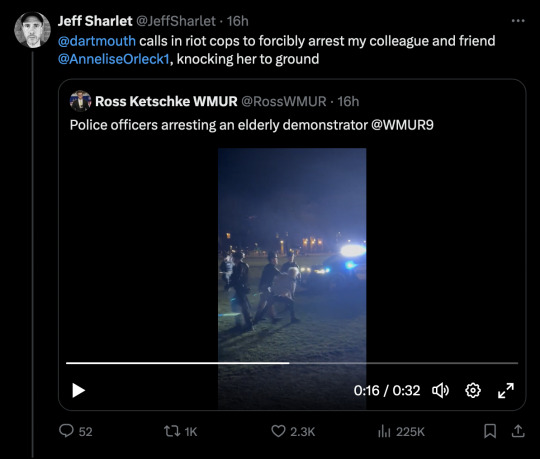
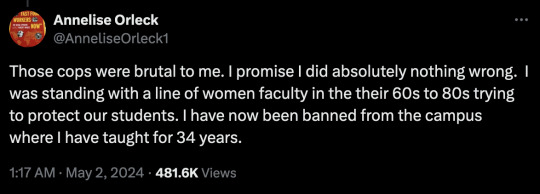
Annelise Orleck, Professor of History, Chair of Jewish Studies, Dartmouth
6K notes
·
View notes
Text
I was punched and pepper sprayed by cops that my university administration set on student protesters yesterday. Including once where a cop ripped my mask off my face, grabbed my jaw, and sprayed pepper sprayed straight into my mouth. The university sent out an alert in the middle of our protest canceling classes for the rest of the day, only citing “adverse conditions”. After protesters dispersed under threat of even more violence and three buses of riot police from all over the state with rubber bullets and bully sticks parked in front of one our school’s famous landmarks. I staggered over to a couple of friends who were watching on the sidelines. They gave me water and an apple and held a bag of ice on my very pepper spray irritated face. As they were walking me back to my dorm we ran into one of their roommates. She had taken cancelled classes as an opportunity to get crumbl cookie with her friends. Standing in front of her, happy in a floral blouse with her box of cookies, in my pepper spray and water soaked tshirt, keffiyeh sadly hanging off my shoulder, holding an ice pack to my mouth, felt like a slap in the face.
After putting my pepper spray soaked clothes, shoes, and keffiyeh in a plastic bag and taking an extraordinarily painful shower, a friend and I went for dinner just off campus. There we had a pot of green tea and ramen to soothe pepper sprayed throats. We got ice cream after (shared a cup with chocolate and raspberry pomegranate with strawberry pieces on top, it was very good). From our spot outside the ice cream place we watched a steady stream of groups of sorority girls in matching jeans shorts and blue bikini tops walking back to their apartments after some apparently raucous parties. The cognitive dissonance was insane. I really felt a little like I was going crazy.
Even this morning, waking up to the smeared sharpie of the National Lawyer’s Guild’s phone number on my arm, a black and blue chest from where a grown man straight up clocked me while I was held up by two other protesters in a wall, and a still sore throat and eyes from the pepper spray, life goes on like normal. I still have final papers to write and a math exam to review for.
I’m not sure I really have a point. But, this feeling only makes me want to fight harder for a free Palestine. So, fuck Israel for being an apartheid state and all of their crimes over the last 76 years. Fuck university administration for not disclosing their level of investment in Israel. Fuck university administration for not divesting from this genocide. Fuck Joe Biden for actively supporting this genocide. And fuck the police.
15K notes
·
View notes
Text
I attended a conference on activism this week (with a specific group, but I figure it's better to keep it vague when posting online). The organizing board led a structured Q&A session where one of them (an elderly black lady) happened to mention she'd been arrested during a protest before. When they opened the floor to questions from the audience, I got the first question, and I asked "So what's it like to be arrested?"
I was genuinely curious. I haven't found myself in that position through my activism yet, but I figure I might in the future.
She said, "Oh it's all planned" and then went on to detail how she and many other members had been through a specific training on being arrested during activism, that they each left for every protest with $50 and the business card of the organization's lawyer, and that they predetermine who is going to be arrested before they go out.
Another member then explained that when they protest in D.C. at the Capitol, the Capitol police are very used to this, so there's basically this theatrical performance that takes place where they protest; the Capitol police show up and warn them that if they continue, they will be arrested; the people who are not predetermined to be arrested leave; and the remaining people wait for the police to come back, handcuff them, and lead them out of the building. It makes the headlines, they go to jail, and then they get let right back out same day.
This is something that I knew happens, but I left with the impression that a large percentage of the people you see getting arrested in activism went out with the intent to have that happen. Additionally, the board members are all volunteers, so some have day jobs. They predetermine who is going to be arrested basically based on whose life will and won't be wrecked by it. The board members with serious jobs that would fire them if they found out they were arrested at a protest are never in the arrest pool. The elderly black lady who was speaking is retired, so an arrest record can't really do anything to her, therefore she's always in the arrest pool.
Side note: They also told us about a member in a powered wheelchair who tries to get herself arrested at every event just because the police don't know what to do. When last did you see a cop car that could take a person in an electric wheelchair? I find that hilarious.
Long story short, some people you see at protests really are risking it all, but there's also a significant portion of people who are literally trained in being arrested at a protest, so if you've ever felt bad for fearing what a police record could do to your life, just know that that's a legitimate concern that large organizations take into account when deciding who to place in conflict with police. Also know that you don't have to completely wing being arrested at a protest if that's something you're willing to do; you can seek out an organization that will offer you training and backing in exchange for your willingness to be arrested for publicity.
1K notes
·
View notes
Text
do people know why american university students are protesting at their colleges, as opposed to their places of government, etc.?
like, I'm sure some of it is proximity -- not all schools are near their state capitals or other centers of power -- but a *lot* of it, and the reason schools like Columbia are shitting themselves over these protests, is because of the endowments
#im just not sure how common knowledge this is#my school had kind of a high ratio of students involved in protesting the administration and i believe still does#but notably they are *not* protesting to this degree. why?#because when they told the president of the college they wanted the school to divest from industries supporting the war on Gaza#the president convened the committee that responds to those demands and they're actively considering the proposal now#(per the student newspaper)#instead of pitching a fit about what they'll do with their obscene amount of money instead of investing it in warmongering companies#will it pan out? idk. it took the committee 6 years to finally divest from the Enbridge pipeline#but the scale of the protests nationally may make them think twice about shooting down the proposal
1 note
·
View note
Text


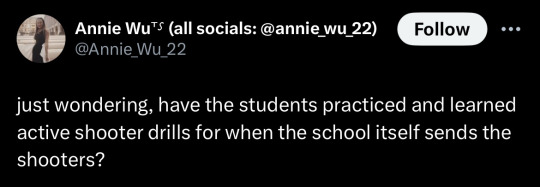

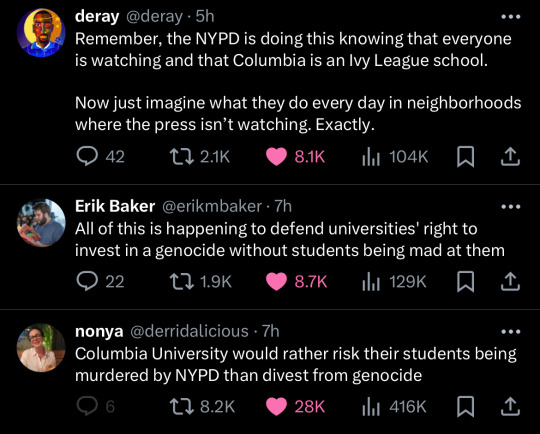

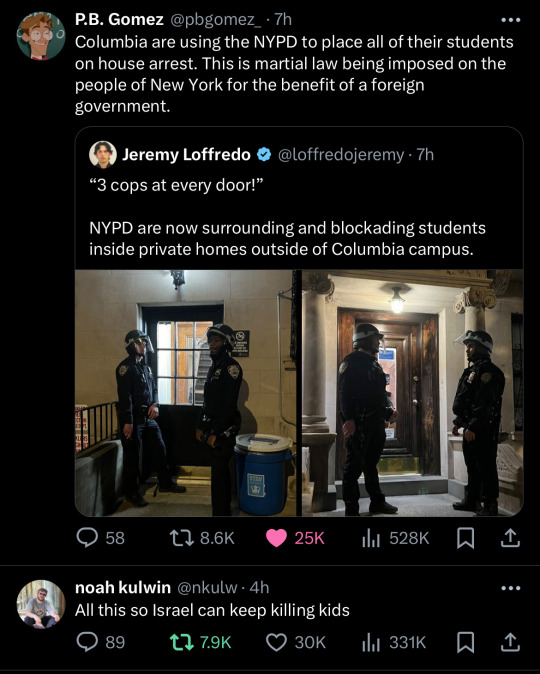

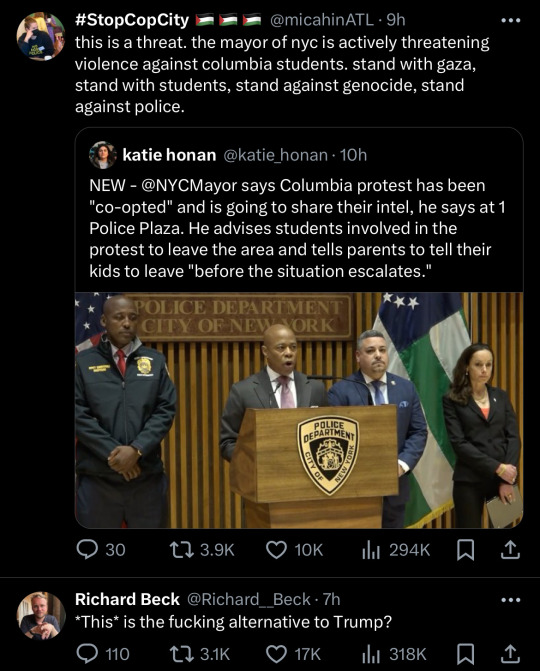
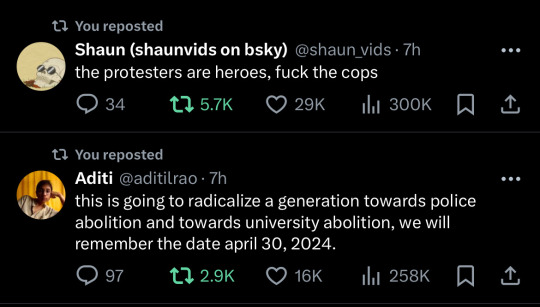
i can’t find words for my anger right now so here’s a collection of thoughts that share the sentiment
37K notes
·
View notes
Text
anyone have any tips for organizing with your apartment neighbors?
not necessarily in a tenants' union way, though that would be nice.
more in the 'some of my neighbors have had domestic altercations in the hall and i want to be a resource to the victims' way. in the 'you have a small child and need a babysitter sometimes' way. in the 'you work during the hours the rental office is open so you have no way to pick up your packages on your own' way.
maybe also in the 'i need to drink some of this homemade wine, anybody want a glass' way
[and also in the tenants' union way. obviously. but that's a later step.]
1 note
·
View note
Text
the problem with autism is sometimes you want to do something (brave) but you need someone to gently walk you through each step so you know what will happen. and people don’t like doing that
149K notes
·
View notes
Text
people who don't wear glasses are so weird like you just wake up and your eyes are pussy fresh??
135K notes
·
View notes
Text
Thank you to @sleepnoises for making the original poll & for giving us the idea to to this :)
Sorry if we couldn’t get your favorite on here, we were limited to only 12 options (11 if you don’t include the “other” option).
6K notes
·
View notes
